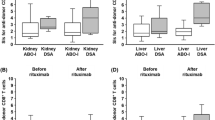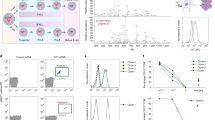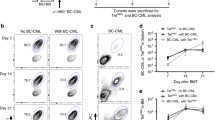Abstract
A WIDE range of immunosuppressive agents can facilitate the induction of specific tolerance by thymus-dependent antigens. In the case of Cyclophosphamide (CY), this involves T cells (including the generation of suppressor T cells), whereas B cells remain relatively unaffected1–3. On the other hand, CY lowers the B cell tolerance threshold to thymus-independent (TI) antigens4,5, a characteristic not shared by other alkylating agents (melphalan and chlor-ambucil) or immunosuppressive drugs (6-mercaptopurine, azathioprine and A-methopterin) (J. G. Howard and C. Hale, in preparation). Although high doses of CY induce selective depletion of B cells6,7, its immunosuppressive potential in vivo or in vitro is manifest with doses well below this cytotoxic threshold (F. L. Shand, in preparation), which is not the case with melphalan and chlorambucil. Consequently, the B cell tolerance-promoting and reversible immunosuppressive activities of CY might be dissociable from its cytotoxicity. We have investigated the ability of splenic B lymphocytes from CY-injected mice to cap and subsequently regenerate their surface immunoglobulin (SIg) receptors following treatment with anti-immunoglobulin. Re-expression of B cell SIg was grossly impaired following treatment with CY, but not with other immunosuppressive agents. This finding provides a possible explanation for the increased susceptibility of B cells to tolerance induction with TI antigens.
This is a preview of subscription content, access via your institution
Access options
Subscribe to this journal
Receive 51 print issues and online access
$199.00 per year
only $3.90 per issue
Buy this article
- Purchase on Springer Link
- Instant access to full article PDF
Prices may be subject to local taxes which are calculated during checkout
Similar content being viewed by others
References
Aisenberg, A. C. & Davis, C. J. exp. Med. 128, 35–46 (1968).
Many, A. & Schwartz, R. S. Proc. Soc. exp. Biol. (N.Y.) 133, 754–757 (1970).
Ramshaw, I. A., Bretscher, P. A. & Parish, C. R. Eur. J. Immun. 7, 180–185 (1977).
Howard, J. G. & Courtenay, B. M. Eur. J. Immun. 4, 603–608 (1974).
Desaymard, C. & Howard, J. G. Eur. J. Immun. 5, 541–545 (1975).
Lerman, S. P. & Weidanz, W. P. J. Immun. 105, 614–691 (1970).
Turk, J. L. & Poulter, L. W. Clin. exp. Immun. 10, 285–296 (1972).
Howard, J. G. & Mitchison, N. A. Prog. Allergy, 18, 43–96 (1975).
Sidman, C. L. & Unanue, E. R. Nature 257, 149–151 (1975).
Raff, M. C. et al. J. exp. Med. 142, 1052–1064 (1975).
Nossal, G. J. V. & Layton, J. E. J. exp. Med. 143, 511–528 (1976).
Klaus, G. G. B., Abbas, A. K. & McElroy, P. J. Eur. J. Immun. 7, 387–393 (1977).
Miranda, J. J. Immunology 23, 829–842 (1972).
Author information
Authors and Affiliations
Rights and permissions
About this article
Cite this article
SHAND, F., HOWARD, J. Cyclophosphamide inhibited B cell receptor regeneration as a basis for drug-induced tolerance. Nature 271, 255–257 (1978). https://doi.org/10.1038/271255a0
Received:
Accepted:
Published:
Issue Date:
DOI: https://doi.org/10.1038/271255a0
This article is cited by
-
Immunological regression of metastatic cancer in the liver as a result of “in vivo xenogenization”
Biotherapy (1990)
-
Cancer chemotherapeutics as immunomodulators
Springer Seminars in Immunopathology (1985)
Comments
By submitting a comment you agree to abide by our Terms and Community Guidelines. If you find something abusive or that does not comply with our terms or guidelines please flag it as inappropriate.



